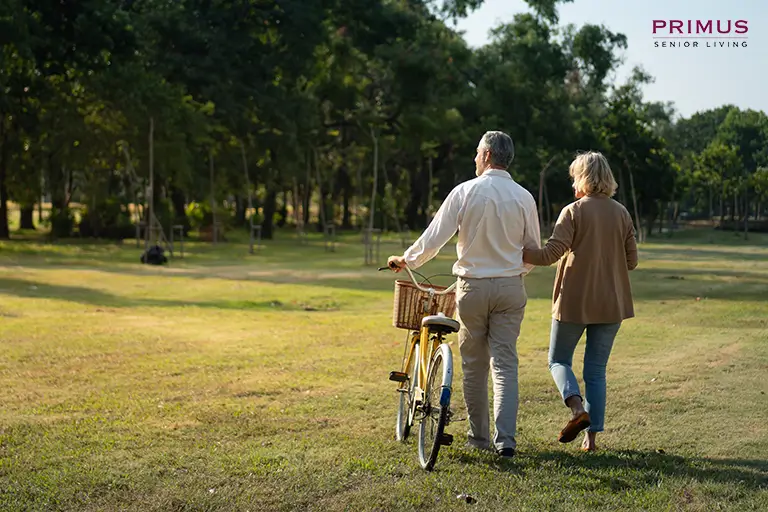Long ago, walking was the only form of transportation available for humans. Persons across age groups walked extensively to get from one place to another. The modern times have bought us the luxury of technology, which has made us notably less active than our ancestors. We have designed workout regimes, diet plans and optimized meals to live half as healthy as they did. But we’ve forgotten that the basic movements of a human body are an exercise by itself.
Walking is a skill most of us mastered around our first birthday and have slowly forgotten as we grew up, bought motorcycles, cars and started taking cabs. It is the most convenient and effective form of exercise. Walking is preferred by adults not just due to its ease, but that’s not the only reason why it’s the perfect exercise for them.
1) It can be just as effective as running. It’s a common notion that the benefits of high-intensity exercises cannot be achieved by other forms of exercise. This interpretation is absolutely wrong. As long as the body uses up the same amount of calories while exercising, be it running or walking, they are all equally effective in managing cardiovascular health.
2) Making it a habit is much easier. People tend to give up on high-intensity exercise routines quickly because of its exhaustive nature. Walking, on the other hand, is a moderate exercise that is easy to continue and stick to for a long while.
3) Walking reduces the risk of old-age disability. Regular walking keeps the bones and muscles strong and active, ultimately reducing the risk of general disabilities that come with aging.
4) It boosts your immune system. The health benefits of walking also include protection against general ailments. Regular walkers get sick less frequently and for shorter terms than the ones who don’t walk.
5) Enhances cardiovascular health. Being the ‘most commonly spoken about’ benefit of walking, it is as real as it gets. Innumerate medical practitioners have linked walking with heart and health benefits. Walking reduces the risk of high blood pressure, high cholesterol, diabetes, heart disease, and cardiac arrests.
6) Walking reduces pain from arthritis. It’s a common misconception that walking might be painful if you have arthritis. Truth is, walking actually reduces and prevents the pain from arthritis by lubricating the knee, hip joints and by strengthening the muscles around them.
7) It fights weight problems. All exercises burn calories, but walking regularly has further benefits in preventing obesity. An hour of walking a day for 3 months is said to cut the effect of 32 obesity causing genes by half. Regular walking also reduces the craving for sugary foods, even in stressful situations.
8) Walking adds years to your life. With its numerous health benefits, it is no wonder than walking can also help increase your lifespan when combined with a few other good habits. In a 2015 study at St. George’s University Hospitals NHS Foundation Trust in London, researchers found that walking 25 minutes a day added up to seven years to participants’ lifespan.
Making it a routine
Even though walking is comparatively much easier than other exercises, it often gets hard to make it a habit for old adults. Here are a few tips to help you out,
- Walk outdoors if the treadmill bores you and walk indoors if the exercise scares you.
- Start with small goals. It’s easier to a brisk walk for long distances when you start with a 3 week light walking routine.
- Try not to walk outdoors when the weather isn’t kind enough to let you.
- Encourage your peers and loved ones but don’t push them over their limits.
- Find a caregiver who can accompany you on your walks.
- Incorporate music or Nordic walking in your walking regime.
Apart from its physical benefits, walking also reduces anxiety and makes you less prone to old-age depression. You will feel more confident and independent when you make walking a routine. It is also a great way to connect and socialize with other elders and add some years to your life with a friend. At Primus Reflection, there are walking trails and peers encouraging you to take up this leisurely activity that will keep you hale and hearty.
So what are you waiting for? Let’s put a foot forward into a happier life.
You may also like

A Never-Ending Vacation Of Primus Seniors: A Case Study
Meet Mrs Uma Raikar, a 63 year old living with her husband. She has worked in Bank of Baroda for 21years as an Accounts Assistant. Mrs Uma was also the Managing Trustee of Vajreshwari temple in Maharashtra for 9 years. She had an exceptional work life, took care of her kid and provided her family with a comfortable life. Age was catching up, but she and her husband were doing just fine with the help of her son.
READ MORE
5 Questions Adult Children Ask About Senior Living!
When it comes to our parents, we want nothing but the best for them. As much as one would want to spend time with their parents and be around them all the time, it's not feasible. That's what Senior Living homes are for. Senior living homes offer your parents the freedom to live their life without the burden of having to depend on anyone under a secure environment. It is only fair that you'd want your parents to be at the best senior living institution.
READ MORE

Leave a Comment